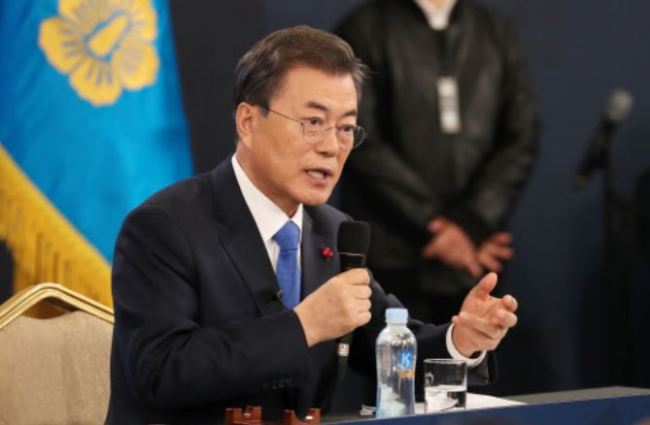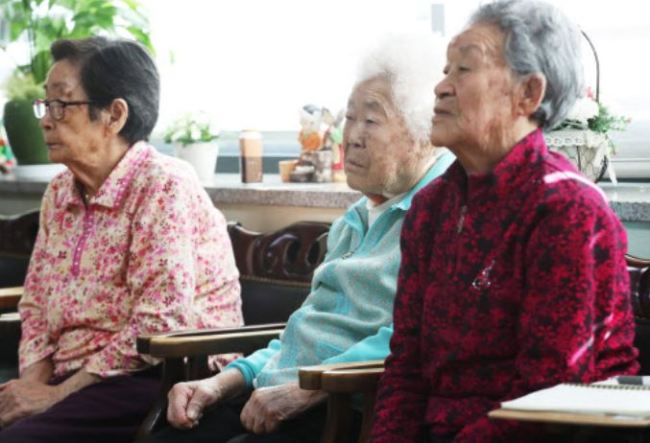President Moon Jae-in on Wednesday said that the government will consult with Japan, victims of Japan’s wartime sexual enslavement and civic organizations on what to do with Tokyo‘s funds earmarked for victims.
In a nationally televised press conference, Moon reaffirmed the Foreign Ministry’s announcement a day earlier that the government would not to seek a renegotiation of the deal, but would replace Japan’s funds with a governmental fund.
“It means that we will heal the wounds of the victims with our government’s money,” Moon said, adding that it would make those who have already received the money not feel ashamed by it and allow those who have not yet received the money to now do so with dignity.
The Reconciliation and Healing Foundation, which was established in July 2016 under the Gender Equality Ministry to help the victims, and the fund of 1 billion yen ($8.95 million) offered by Japan were a key result of the 2015 Korea-Japan deal over victims forced into sexual servitude at wartime Japanese front-line brothels.
 |
President Moon Jae-in delivers his New Year`s speech at Cheong Wa Dae, Wednesday, Jan. 10, 2018. (Yonhap) |
In the deal signed on Dec. 28, 2015, Japan offered the funds, worth about 10.8 billion won, to the foundation along with an apology to the victims in return for Seoul’s promise not to raise the issue again in international forums. The two countries described the deal as “final and irreversible.”
Of the funds provided by Japan, about 4 billion won was paid to 36 surviving victims among the 47, as well as families of deceased victims, according to the government. The Foreign Ministry said it would set aside the equivalent of 1 billion yen from its own budget.
Moon also said the Korea-Japan deal over the victims was “unsatisfactory,” but it was “realistically the best way,” reaffirming the Foreign Ministry’s announcement the day before.
“The issue can only be resolved when Japan accepts the truth, makes a heartfelt apology to the victims, learns its lessons, and cooperates with the international community (in preventing the recurrence of such a thing),” he said.
The Foreign Ministry said Tuesday that the issue remains unresolved and there were procedural problems, as victims were excluded in the process, but it would not seek to renegotiate the deal.
 |
Former comfort women at their shelter in Gwangju, east of Seoul, on Jan. 10, 2018, watch President Moon Jae-in deliver his New Year`s speech via TV. |
Japan, victims unhappy
The government’s decision, which appears to be aimed at minimizing adverse impact scrapping the accord could have on Korea-Japan relations, drew protests from both Japan and victims of Japan’s sexual enslavement.
In response to Seoul’s calls for a sincere apology, Japanese Foreign Minister Taro Kono said Tuesday that Tokyo could not accept South Korea’s demands for additional measures. Japan has urged South Korea to abide by the accord, saying any attempts to amend it could harm bilateral ties. The Japanese government reportedly filed a formal protest with the South Korean Embassy in Tokyo over Moon‘s remarks shortly after the conference, according to Kyodo News.
Some victims and victims’ rights groups also expressed anger over the government’s failure to rescind the deal and disband the Reconciliation and Healing Foundation.
“What matters is how victims think about it. The victims were disappointed by the government’s decision not to seek a renegotiation of the deal,” said Ahn Shin-kwon, director of the House of Sharing, a nursing home for nine surviving victims.
“The government focuses on a ‘victim-focused’ approach, but why do they just move on like this? We don’t want the government’s money. Victims want an apology from Japan and legal compensation,” he said.
Oh Sung-hee, secretary-general of the victims’ rights group Justice and Memory Foundation, said the remaining task is to return the money and dissolve the foundation, which is the key basis of the comfort women deal. Victims’ rights groups have continued to hold weekly rallies demanding Japan‘s apology in front of the Japanese Embassy in central Seoul and criticized the government decision as insufficient to resolve the sex slavery issue.
Experts, on the other hand, said the government made a “realistic” decision to find middle ground between Japan and bitter public sentiment.
“In a positive aspect, it is not bad that the government set aside its own budget for the victims,” said Kim Sung-han, a former foreign affairs and trade vice minister. “But its effort to satisfy every stakeholder led to a failure to satisfy any stakeholder.”
“I am worried that the government’s stance will take a toll on relations between South Korea and Japan, especially at a critical moment when the two countries need to stand united against North Korea’s nuclear and missile provocations.”
While on the campaign trail, Moon promised to renegotiate the comfort women deal, but also to “normalize” Korea-Japan relations severed by over historical issues.
Moon has pursued a two-track approach toward Japan, separating historical disputes from other issues. The Foreign Ministry on Tuesday reiterated it would continue to seek to “harmoniously” and “peacefully” tackle the historical issues while pursuing a future-oriented relationship with Japan.
By Ock Hyun-ju (
laeticia.ock@heraldcorp.com)









